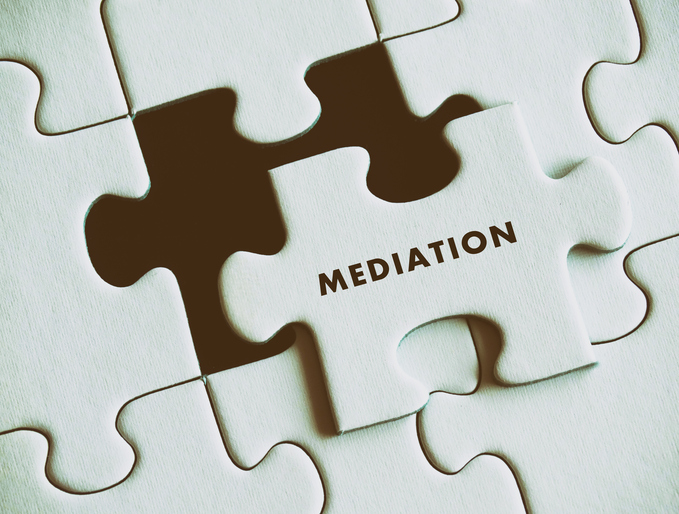Many clients ask us to explain precisely what happens at a mediation. The short answer is A LOT! Some attorneys downplay the significance of the mediation. Still, after practicing law for more than 25 years and attending hundreds of personal injury and employment case mediations and settlement conferences, I’ve discovered that attorneys often bring their clients unprepared. They downplay the event’s significance and tell their clients it’s an “easy” day. Never underestimate any step of the litigation process. You may be making the single most significant financial decision of your life. Be prepared!
Myths and half-truths about mediation
Most lawyers will tell their clients that mediation is a “voluntary” event. They will explain that it is an opportunity to have an open dialogue with the goal of an amicable resolution. Technically, everything said in mediation is confidential and can’t be used against you in a trial. Your agreement or consent is necessary for anything to happen. A mediator is a facilitator, not a judge.
While all of this is correct, much more is happening at mediation. A reasonable attorney will prepare their client for this meeting by explaining the hidden clues and psychological manipulation that occurs during a mediation. To prepare for your case, we’ve put together some key points that will help maximize your benefits and prepare you for your mediation.
 What to expect during your first group session with a mediator
What to expect during your first group session with a mediator
Some mediators are better than others, and they all handle mediation differently. While less prevalent now, some mediators will first hold a group session with everyone. Theoretically, this session explains expectations and puts the parties at ease. Unfortunately, this is a manipulative way to assess the group. A group opening session is typically held because the defense attorney/claims adjuster has never met you. First, they want to see what you physically look like. Then, you’re asked basic questions under the guise that the mediator is trying to understand your story. In reality, they are using your answers to sample your testimony. Your answers will help the adjuster and defense lawyer see how you present as a witness.
During this initial meeting, you are being judged. They want to see if you are professional, blue-collar, educated, a complainer, etc. Your appearance and your responses give huge clues on how you will be as a witness. This short interview is like a job interview. The defendant and adjuster will make assumptions about your ability to testify in just a few minutes. These answers will impact how they evaluate your case.
What to expect during your first private session with the mediator
Today, most mediators don’t start with a group session. Instead, they begin with a private meeting between the mediator, the injured person, and their attorney. The session will seem casual, relaxing, and non-eventful. However, there is much more going on. Below is an example of how the session will likely go and what the “casual” comments mean.
- Hey old buddy, how have you been?
Most mediators will speak with your attorney as if they are an old buddy or try to connect with them by mentioning familiar friends. While this seems innocent, it is an intentional manipulation by the mediator to get the injured person to believe they are on their side. They will appear to be friends with your lawyer. Even if they are friends, this banter is a show. The mediator tries to get you to let your guard down and connect.
- You’ve got a great lawyer!
When the mediator turns their attention to you, they will probably compliment your attorney. While these comments might seem innocent, they are also manipulation tools. As the meeting continues, your attorney and the mediator may get close to a settlement value. If you hesitate, the mediator will revisit what a great lawyer you have and how you should listen to your lawyer. By making those statements early on and getting you to agree, the mediator can use those statements to manipulate you into taking your attorney’s advice.
*If you’ve hired a reasonable attorney, you should defer to their advice because they’re more experienced. A skilled, veteran attorney should have a good idea of the case’s value.
- I’m not taking sides.
The mediator often tells you they are neutral and are not there to judge or take sides. Technically, this is true, but it’s misleading. Mediators make great money. Lawyers will often hire them if they can settle the case. A mediator who settles cases will get hired again. A mediator will manipulate the moveable party to change their position. Fairness is not their end game. They want to get the deal done, even to your detriment. By the end of the day, they have chosen sides.
- Could you tell me your story?
In an opening session, the mediator will ask you to tell them “what happened.” While this may seem like an innocent conversation, the mediator already knows your story. Before your meeting, they are given written briefs, supporting records, images, and other relevant materials. Your “story” will do little to change the case.
But they offer an opportunity to help you with the “healing process.” After being victimized, most people want to have their proverbial day in court or to tell their side to a neutral party. The mediator allows injured people to vent, get matters off of their chest, and be heard. They are essentially removing a possible psychological barrier to settlement.
- Turn you against yourself.
During the first session, the mediator also tries to manipulate you into identifying the weaknesses in your case without being confrontational. This is often done after you finish telling your side of the story. You may get questions or comments like, “Wow, it does sound like you have been wronged and been through a lot. I am curious how the other side can even respond to that. What do you think they will say? What do you think they will use against you or to respond?”
In those short statements, the mediator has psychologically patted you on the back and started you thinking about potential weaknesses. Most mediators will explore weaknesses based on what you say in the first session. They will only spend 10-20% of the time discussing weaknesses. It’s their goal to plant a seed they will use later.
- I’m going to see how I can help you.
As the session concludes, the mediator will vaguely suggest they will “help you.” They say this because they want you to believe your case is solid and that they will champion your case to the other side. A good mediator rarely asks for numbers in the first session. They only confirm each party’s positions before they arrive.
While the session seemed like a casual discussion about the case, a good mediator would leave the meeting knowing his odds and whether he would get the deal done.

Time with the Other Side
After the session, the mediator will leave the room and visit the defendants. The dialogue with the defendant is similar if the defendant is not insured and he/she is there personally. If the defendant is insured, the dialogue will be more streamlined because claims adjusters are usually seasoned professionals and understand the mediation process.
Sometimes, clients are concerned when the mediator spends more time with one side or the other. It’s important not to read into this during the early stages of a mediation. If this occurs near the end of a long day, it may be a sign the other party is not willing to negotiate further. However, that is only one of several reasons a session could be brief or prolonged.
The “Money Session” (typically the second session)
Most parties need to prepare better for the second session. Unfortunately, this session is usually the most powerful. There’s usually a seemingly innocent interchange about money. This is where the mediator will test your range and how you react. Your answers and body language can make or break your case. Here are some examples of what the mediator will say in the second session and what it means.
- You were right.
When the mediator returns to the room, they generally reassure you that the other side is there in good faith and ready to settle. The mediator is trying to reassure you and will often use the following type of statement:
“Good news! You are right about the strengths of your case. The other side seems to recognize some of your injuries, and they’re here with the right mindset to settle the case.”
Then, the mediator may further discuss your strengths to build even more confidence.
- Watering the bad seed
After the mediator feels they have you in the right mindset, they will start watering the seed they planted earlier about the problems with your case. The word “problem” is often disguised using a softer word like “challenges.” He will usually say again, “You were right,” and follow up with, “They are going to argue . . ., so it appears we are all on the same page.”
The mediator will then ask you more questions about the weak points in your case. He will get you to give as much detail as possible because he is looking for ways to respond to the other side. In many of these sessions, you’ll spend 60-70% of the time talking about the challenges in the case. A good mediator will get you to speak as much as possible about problems with your case, all while trying to keep your confidence in him and the process.
- The Money Play
This is the most critical moment in the mediation. Typically, near the end of the second session, the mediator will make a very subtle money play. They won’t ask you what you want or what you could “live with” but will throw a number at you very innocently. It usually sounds like this:
“We will be lucky to get six figures on the table.”
“I’m thinking they will be fighting to pay over $90K.” or
“$90K would be a near miracle. $70K is more what they are probably thinking.”
Your response, or lack thereof, to that statement is the most critical moment in the mediation process! The mediator is trying to see how you react. A glimmer of relief tells the mediator that he’s in the ballpark, and you’ll likely agree to settle for less than that number. A frustrated or angry response tells the mediator he’s not in the range and more money will be required. A non-reaction/ambivalence tells the mediator that he hit the nail on the head and must close it with the other side.
A reasonable attorney will prepare you and them for this casual money play so that you can play your poker face correctly. This moment should be carefully choreographed between you and your attorney because it will set the tone and objectives for the day.
The “Opening Demand”
In the third session, most mediators will start getting you to “make a move.” They will want you to make a formal demand that conveys that you are willing to compromise but gives you room to get the desired result. There is no magical formula for picking the perfect starting point. If your attorney has adequately prepared you, this is the time you should consider leaving it in your attorney’s hands.
- The Opening Offer
Sit on your hands, take your heart medicine, and check in with your anger counselor because the “opening offer” will be considered offensive to you. It’s simply part of the process. In all reality, the defendants probably thought the same of your opening demand. If you go into the mediation knowing this will happen, you will be better prepared for the next poker move. If you let your emotions take over, your case will suffer.
- The Counter Demand
Besides the money play, your counter-demand is the second most crucial moment of the day. It’s your ballpark figure. Mediations will become unproductive if you are too far out of the ballpark. If you are too low, you tend to settle your case short. Your second round of bidding shouldn’t be rushed or taken lightly. Put the most effort into this round.
- The Counter Offer
The counteroffer is the first intelligent number the other side deems fair. If this offer is offensively low, your lawyer should tell you to pack up and go home because the day will not be productive. If it is just “very low” instead of “offensively low,” you may continue meditating.
- The Roller Skate Stage
Once you reach this stage, the mediator becomes more of a courier and comforter. They typically lose their ability to manipulate you or the other side. They only go back and forth, delivering numbers.
Once they see one side reaching the end of their negotiating, they will use the physiological material they collected from you earlier in the mediation. They will use your own words on your weaknesses, rely on your relationship with your attorney to suggest you take the deal, remind you your lawyer is “excellent,” and pressure you to follow their advice.
In addition to the psychological material they planted earlier in the day, they will comment on the length of the day. Most people are not accustomed to negotiating for five to eight hours, and fatigue will set in. Additionally, no one wants to “waste” a day without reaching a result. They will use this against you as well.
Why Go To Mediation?
Don’t let this information discourage you. Mediation is the preferred way to settle your case because it allows you to resolve your issues on your terms without delivering your case to a judge and jury. However, mediation should not be taken lightly. Don’t show up unprepared. Watch for the hidden cues and psychological ploys so you can maximize them to your benefit.
Say something if you don’t feel your attorney is preparing you adequately for a mediation. Mediation is a HUGE deal! It’s likely the single most significant financial decision you will make. So be prepared, educate yourself on the process, and confidently get the money you deserve.

